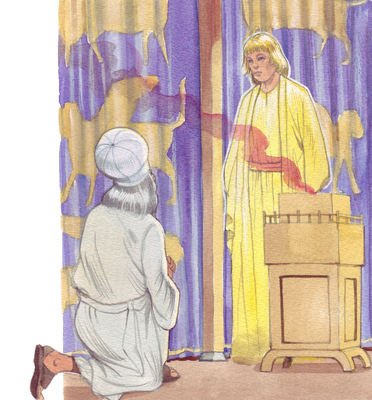A Great Assent
Mary’s assent to the will of God can be seen as second only to that of her son, Jesus, as He faced the prospect of execution.

A Great Assent
General Shaw Clifton
Scripture: Luke 1:26-38
“’I am the Lord’s servant,’ Mary answered. ‘May it be to me as you have said.’ Then the angel left her” (Luke 1:38)
Mary’s assent to the will of God can be seen as second only to that of her son, Jesus, as He faced the prospect of execution (Luke 22:42). It is impossible to imagine the consequences had she said “no” instead of “yes.” Let us focus on her encounter with the angel, and then upon her ready assent.
Gabriel’s Mission
Gabriel is a name meaning “God sent.” Before Luke tells us of his appearance to Mary, we see him engaged with Zechariah (1:19) telling him that he and his wife, Elizabeth (Mary’s cousin), would parent a son to be named John, and this despite their advanced years. Luke portrays Gabriel as being pretty strict with Zechariah (1:19-20) upon whom he imposes an inability to speak until John is born, a penalty for doubting – some would say not unreasonably – the prophecy (1:18).
 Gabriel is a representative of the heavenly world, a messenger from God. His appearing in the narrative is Luke’s way of telling his readers that the supernatural has burst into the world of humans. Note, however, that the New Testament makes it clear that angels have a place and role with boundaries: they are not equal with Christ (Ephesians 1:20); as an apostle, Paul’s divine commission is superior to the role of the angels (Galatians 1:8); Christlike love is better than the tongues of angels (1 Corinthians 13:1); no angel can separate us from the love of God (Romans 8:38); nothing in Heaven can claim to be superior to Christ (Colossians 1;15ff). Regardless of these limitations, the angels of the New Testament bring reassurance (1:30) because they come from the immediate presence of God. Only Gabriel and Michael (Jude 9; Revelation 12:7) are named. In Jewish belief all angels are male.
Gabriel is a representative of the heavenly world, a messenger from God. His appearing in the narrative is Luke’s way of telling his readers that the supernatural has burst into the world of humans. Note, however, that the New Testament makes it clear that angels have a place and role with boundaries: they are not equal with Christ (Ephesians 1:20); as an apostle, Paul’s divine commission is superior to the role of the angels (Galatians 1:8); Christlike love is better than the tongues of angels (1 Corinthians 13:1); no angel can separate us from the love of God (Romans 8:38); nothing in Heaven can claim to be superior to Christ (Colossians 1;15ff). Regardless of these limitations, the angels of the New Testament bring reassurance (1:30) because they come from the immediate presence of God. Only Gabriel and Michael (Jude 9; Revelation 12:7) are named. In Jewish belief all angels are male.
I like this poem about Gabriel entitled “Annunciation,” that I read on the website of The Society of Classical Poets. It is by J.C. Scharl, who lives in Colorado Springs, CO, USA:
Beyond the brimming ages Gabriel waits,
his foremost message burning on his breath.
Through time men slide, creeping through the gates
of birth and out again the doors of death.
He sees kings rise and kingdoms fall to dust;
he sees unnumbered souls unfleshed;
to some he gives slight hints,
but the full knowledge must wait,
for his best words are not for them.
Then at last, coming from afar
he sees, gleaming like a golden pin in time’s folds,
Mary, rising like a star
above the fretted seas of what had been;
bright hinge of which the gate of Heaven creaks,
to her he turns, inclines himself, and speaks.
Gabriel’s message was brief, but of eternal significance (1:31ff): you will have a baby; He will be male; you are to name Him Jesus; He will be “Son of the Most High”; His kingdom will never end; the Holy Spirit will come upon you and overshadow you; you son will be “Son of God”; your cousin, Elizabeth, will give birth in her old age; nothing is impossible with God.
Mary’s Assent
John Wesley, in his 1754 Explanatory Notes on the New Testament, suggests that the actual moment of Mary’s conception was as she spoke the words of assent recorded in Luke 1:38 – “May it be to me as you have said.” Then and there Gabriel left her, the annunciation complete. We have no record of what Mary did next, but later she made ready to visit Elizabeth in the hills of Judea.
Mary’s assenting spirit was passed on by her manner of raising her son. We noted earlier His great assent in the face of a terrible death (Luke 22:43). Mothers have great power. What are today’s mothers instilling into their children?
Assenting to God’s will may be the precursor of still further assents over time. Mary assented at the start of her son’s life, but she needed equally to assent at the end as she stood at the foot of His cross to her Him say: “Father, into Your hands I commit My spirit” (23:46).
Sometimes we are called to say “yes” to God not knowing what all the consequences may be. Mary could not foresee what lay ahead for her or her son. Yet her example can still be an inspiration, a challenge to us as parents. Let us not utter the worldling’s prayer: “Thy will be changed!” Let us, in Advent, find grace to pray: “They will be done, and let it be done in me.”
Advent can be a season of giving thanks for mothers who are open to God. Lest us close with some “Beatitudes for Mothers”:
- Blessed are the mothers who love God for their children will not be ignorant of their Creator and His plans concerning them.
- Blessed are the mothers who love the house of God, for their children will enter there and sit with them in the presence of God.
- Blessed are the mothers who love the Word of God, for their children will know the Way, the Truth and the Life.
- Blessed are the mothers who pray, for their children will feel the power of prayer and many shall find salvation.
- Blessed are the mothers who love to speak kind words to their neighbors’ children, for thereby they win other boys and girls to Christ.
- Blessed are the mothers who love to fight life’s battles bravely with a steadfast faith, for their children will know where to find strength in their time of need.
- Blessed are the mothers who, when they are old and grey, can look back with no regret and say: “I brought up my children in the fear of the Lord.”
Excerpt from Sacred Risk by General Shaw Clifton. Published by The Salvation Army International Headquarters, 2021. All rights reserved.
Now, listen to this beautiful rendition of the classic, "Mary, Did You Know?"
